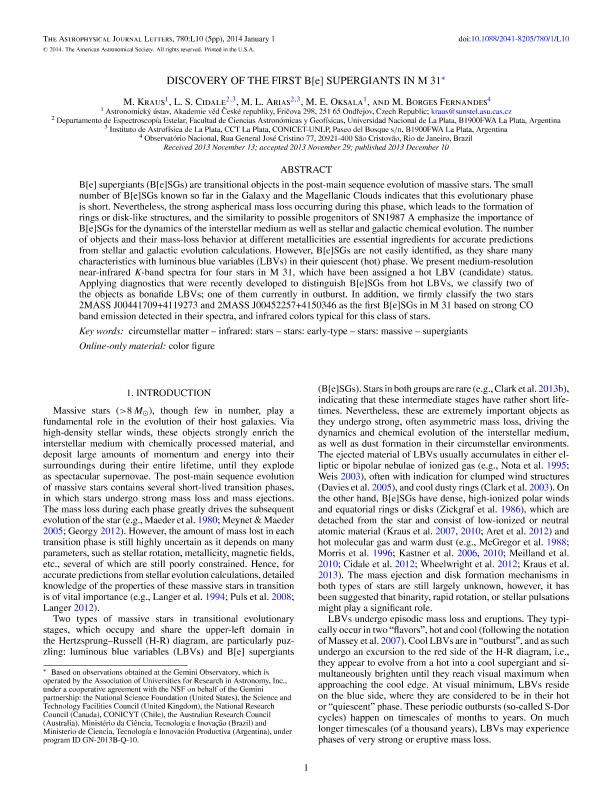Mostrar el registro sencillo del ítem
dc.contributor.author
Kraus, Michaela
dc.contributor.author
Cidale, Lydia Sonia

dc.contributor.author
Arias, María Laura
dc.contributor.author
Oksala, M. E.
dc.contributor.author
Borges Fernandes, M.
dc.date.available
2017-04-20T15:52:37Z
dc.date.issued
2014-01
dc.identifier.citation
Kraus, Michaela; Cidale, Lydia Sonia; Arias, María Laura; Oksala, M. E.; Borges Fernandes, M.; Discovery of the first B[e] supergiants in M 31; Iop Publishing; Astrophysical Journal; 780; 1; 1-2014; 1-5
dc.identifier.issn
0004-637X
dc.identifier.uri
http://hdl.handle.net/11336/15501
dc.description.abstract
B[e] supergiants (B[e]SGs) are transitional objects in the post-main sequence evolution of massive stars. The small number of B[e]SGs known so far in the Galaxy and the Magellanic Clouds indicates that this evolutionary phase is short. Nevertheless, the strong aspherical mass loss occurring during this phase, which leads to the formation of rings or disk-like structures, and the similarity to possible progenitors of SN1987 A emphasize the importance of B[e]SGs for the dynamics of the interstellar medium as well as stellar and galactic chemical evolution. The number of objects and their mass-loss behavior at different metallicities are essential ingredients for accurate predictions from stellar and galactic evolution calculations. However, B[e]SGs are not easily identified, as they share many characteristics with luminous blue variables (LBVs) in their quiescent (hot) phase. We present medium-resolution near-infrared K-band spectra for four stars in M 31, which have been assigned a hot LBV (candidate) status. Applying diagnostics that were recently developed to distinguish B[e]SGs from hot LBVs, we classify two of the objects as bonafide LBVs; one of them currently in outburst. In addition, we firmly classify the two stars 2MASS J00441709+4119273 and 2MASS J00452257+4150346 as the first B[e]SGs in M 31 based on strong CO band emission detected in their spectra, and infrared colors typical for this class of stars.
dc.format
application/pdf
dc.language.iso
eng
dc.publisher
Iop Publishing

dc.rights
info:eu-repo/semantics/openAccess
dc.rights.uri
https://creativecommons.org/licenses/by-nc-sa/2.5/ar/
dc.subject
Circumstellar Matter
dc.subject
Infrared: Stars Stars: Early-Type
dc.subject
Stars: Massive Supergiants
dc.subject.classification
Astronomía

dc.subject.classification
Ciencias Físicas

dc.subject.classification
CIENCIAS NATURALES Y EXACTAS

dc.title
Discovery of the first B[e] supergiants in M 31
dc.type
info:eu-repo/semantics/article
dc.type
info:ar-repo/semantics/artículo
dc.type
info:eu-repo/semantics/publishedVersion
dc.date.updated
2017-03-27T15:55:23Z
dc.journal.volume
780
dc.journal.number
1
dc.journal.pagination
1-5
dc.journal.pais
Reino Unido

dc.journal.ciudad
Londres
dc.description.fil
Fil: Kraus, Michaela. Astronomický ústav, Akademie Véd ceské Republiky; República Checa
dc.description.fil
Fil: Cidale, Lydia Sonia. Consejo Nacional de Investigaciones Científicas y Técnicas. Centro Científico Tecnológico la Plata. Instituto de Astrofísica de la Plata; Argentina; Argentina. Universidad Nacional de la Plata. Facultad de Ciencias Astronómicas y Geofísicas; Argentina
dc.description.fil
Fil: Arias, María Laura. Universidad Nacional de la Plata. Facultad de Ciencias Astronómicas y Geofísicas; Argentina. Consejo Nacional de Investigaciones Científicas y Técnicas. Centro Científico Tecnológico La Plata. Instituto de Astrofísica de La Plata; Argentina; Argentina
dc.description.fil
Fil: Oksala, M. E.. Astronomický ústav, Akademie Véd ceské Republiky;; República Checa
dc.description.fil
Fil: Borges Fernandes, M.. Ministério de Ciencia, Tecnologia e Innovacao. Observatorio Nacional; Brasil
dc.journal.title
Astrophysical Journal

dc.relation.alternativeid
info:eu-repo/semantics/altIdentifier/url/http://iopscience.iop.org/article/10.1088/2041-8205/780/1/L10/meta
dc.relation.alternativeid
info:eu-repo/semantics/altIdentifier/doi/http://dx.doi.org/10.1088/2041-8205/780/1/L10
Archivos asociados
